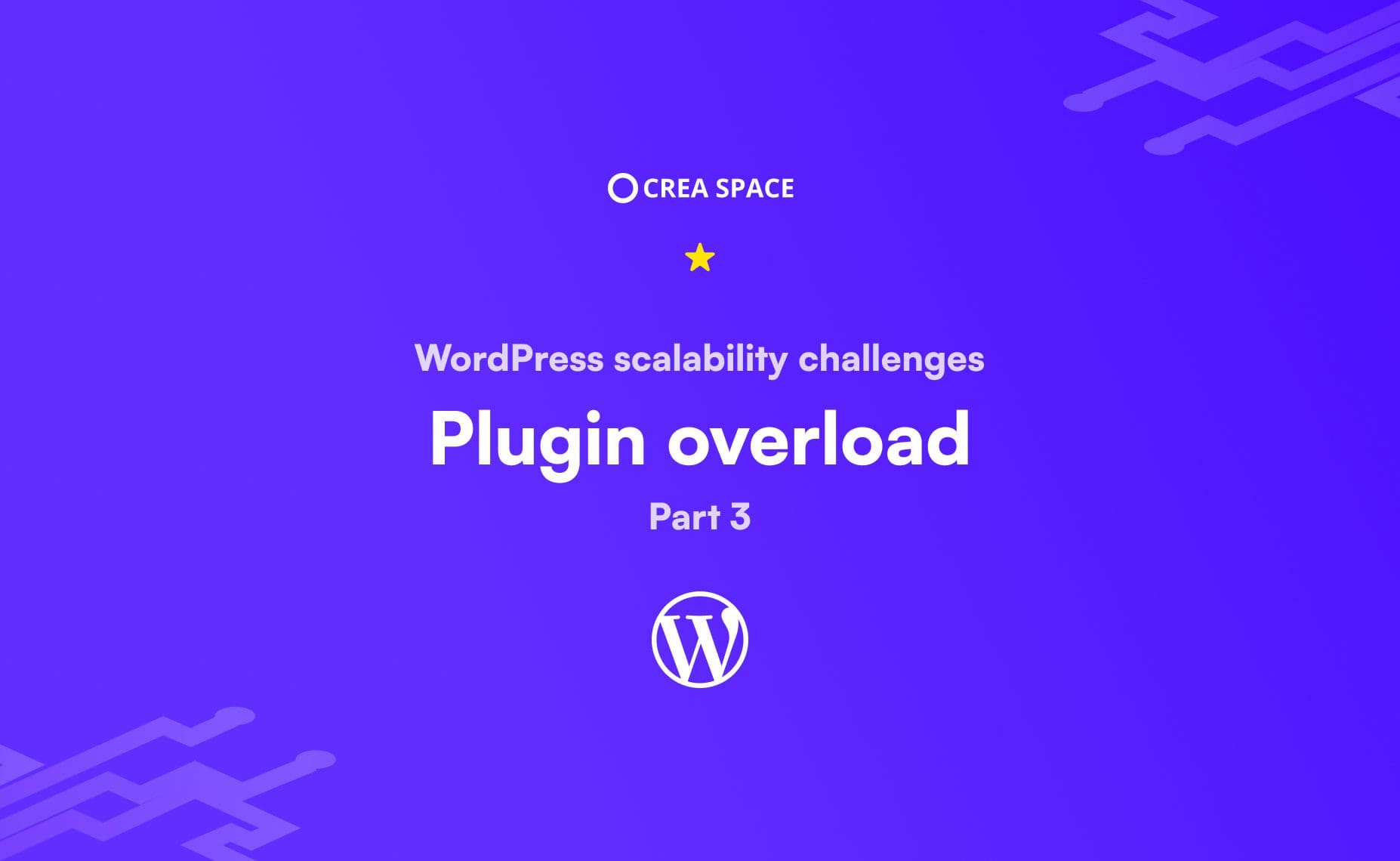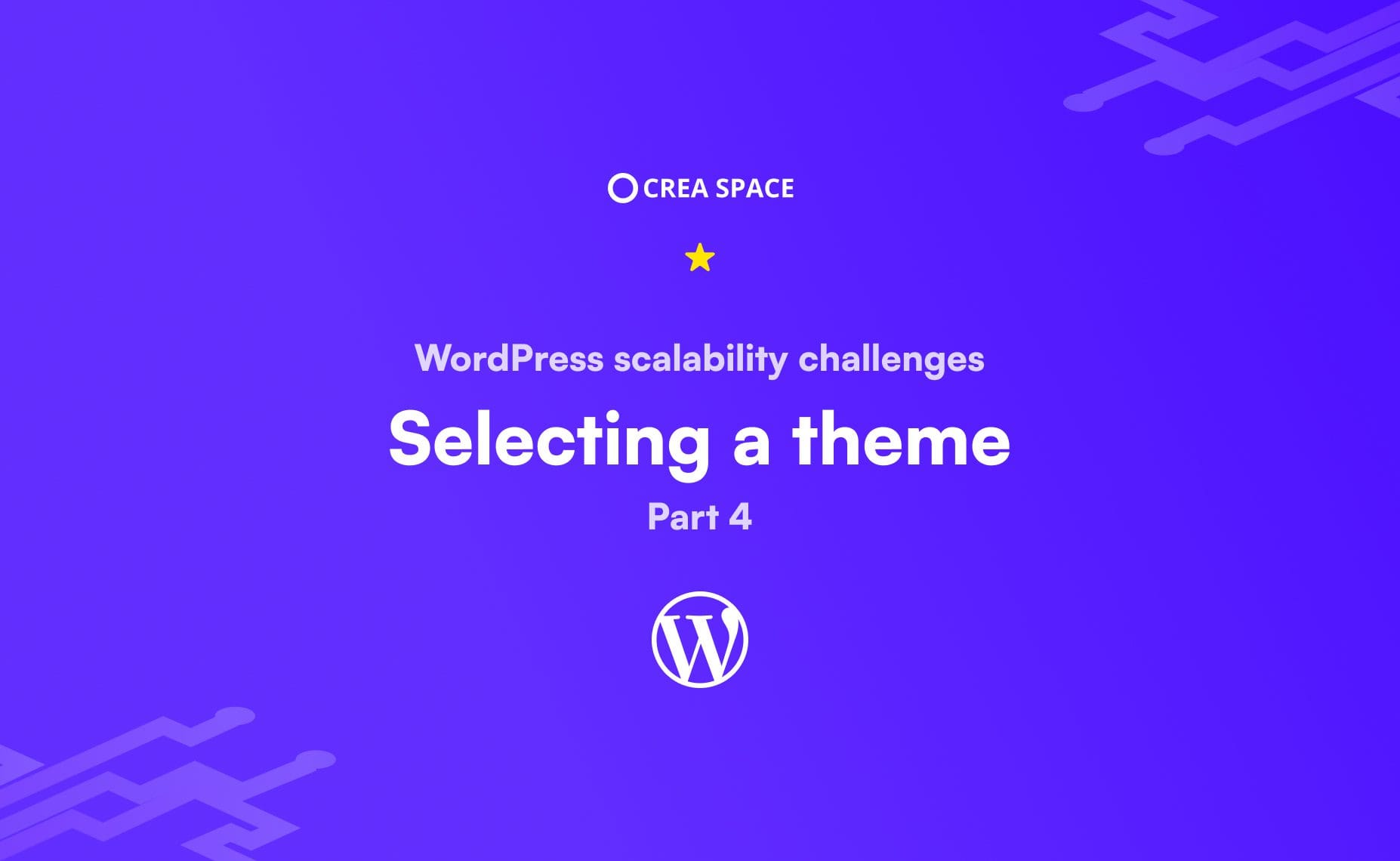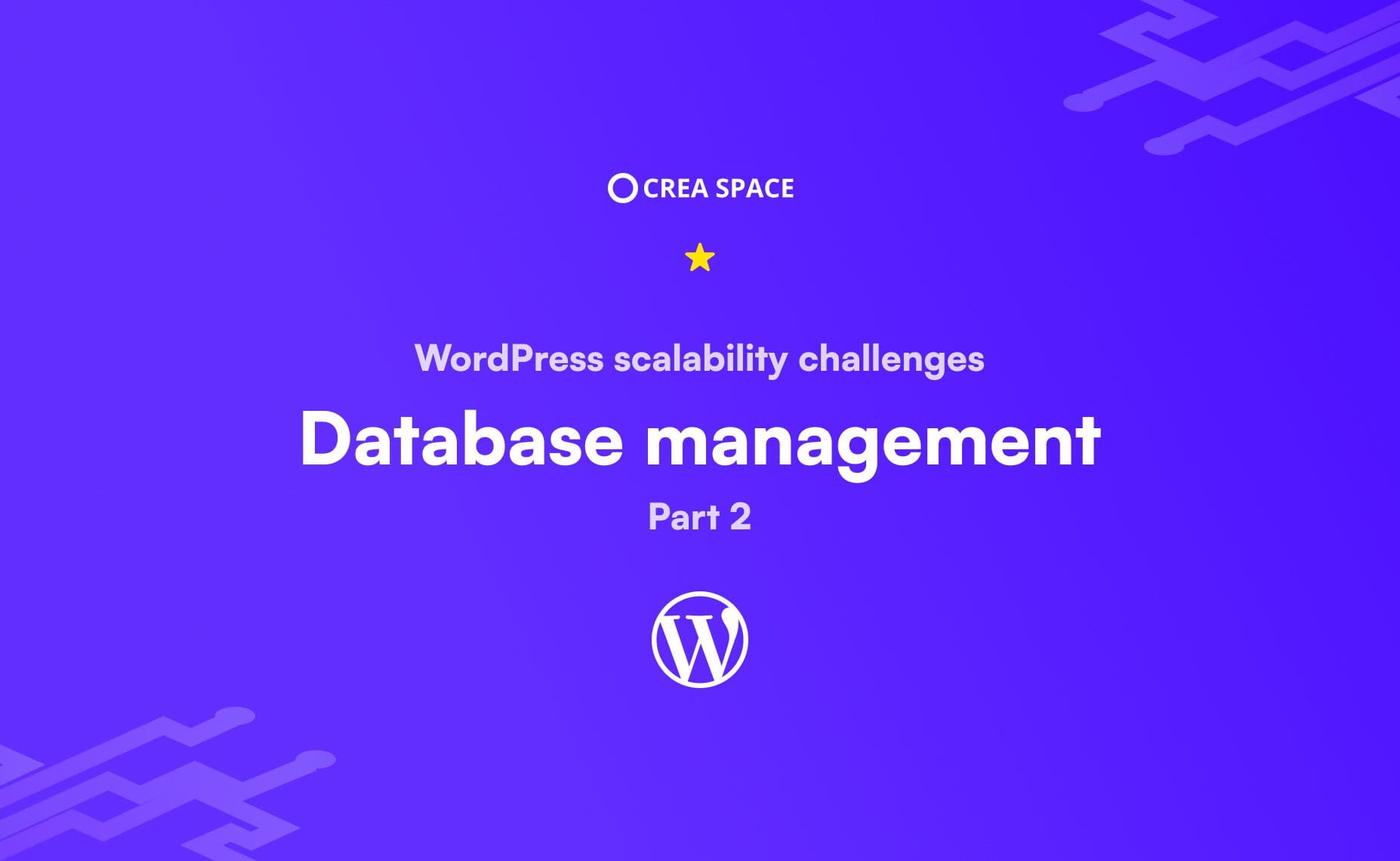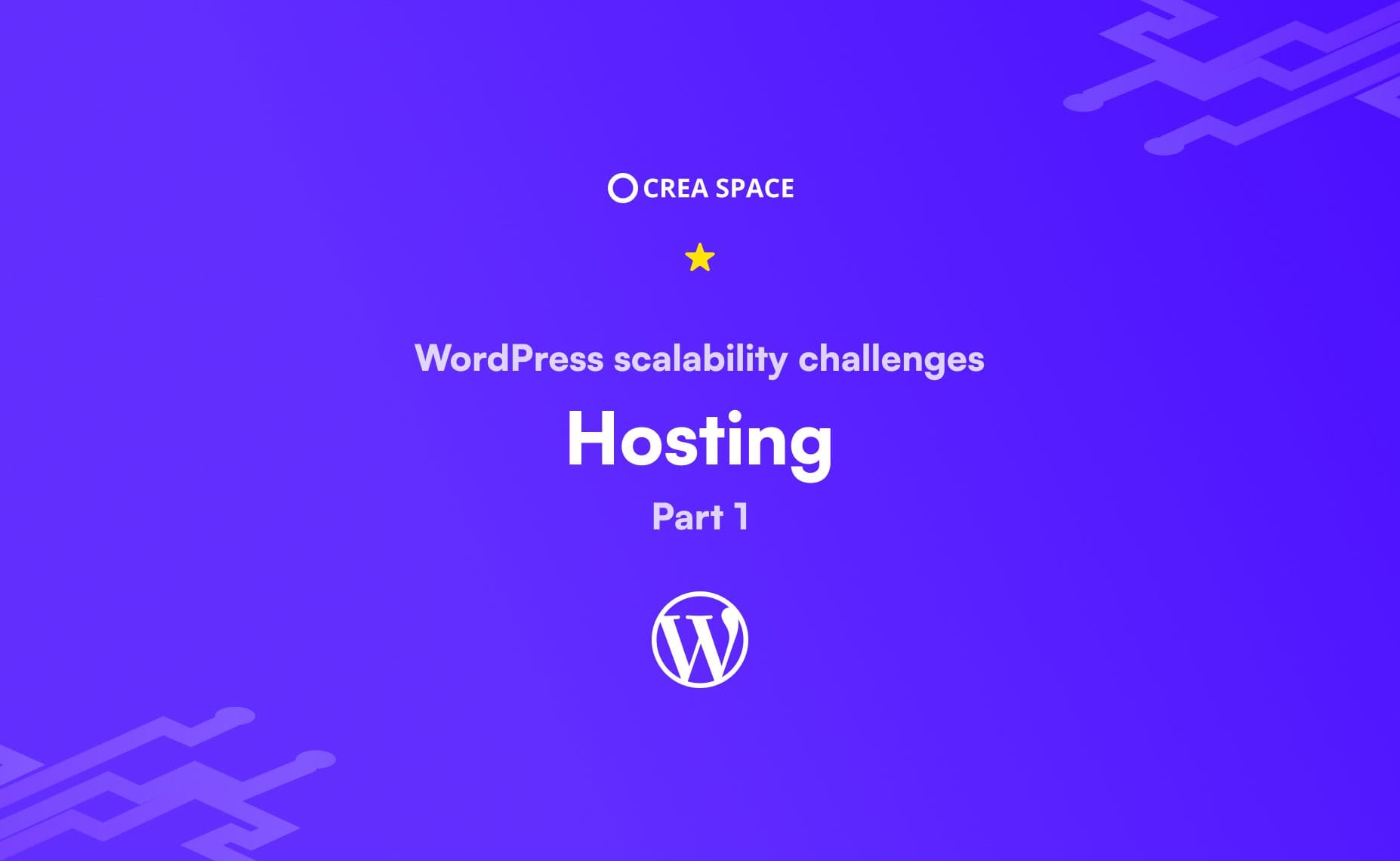What is scalability?
Is WordPress scalable?
PART 2 - Database management
PART 3 - Plugin overload
PART 4 - Theme choices
PART 5 - Headless WordPress
WordPress plugins are valuable for adding functionality to your website, but they can sometimes hinder your site's scalability. When you overload your WordPress site with plugins, especially those lacking performance optimization, it can lead to a significant slowdown in website speed and overall performance. This overabundance of plugins can result in an excess of server requests, bloated databases, and even create potential security vulnerabilities.
In this section, we delve into the far-reaching effects of plugin overload on your WordPress site. We'll explore the importance of strategic plugin selection and management to ensure optimal performance. Key considerations include the need to prioritize lightweight and well-coded plugins, the benefits of conducting regular plugin audits, and the option of custom development to reduce reliance on multiple plugins. By adopting a more streamlined plugin strategy, you can effectively maintain a WordPress site that is not only fast, secure, and scalable but also well-optimized for search engines and user experience.
Understanding the scalability impact of WordPress plugin overload
Comprehending the implications of WordPress plugin overload is crucial for maintaining an optimal site performance. While plugins can certainly enhance your website's functionality, having an excessive number of them can significantly impede your site's speed, especially when these plugins are resource-intensive or poorly coded. Each additional plugin contributes to your server's workload, potentially resulting in longer loading times and heightened utilization of server resources. This concern becomes particularly pronounced as your website grows and attracts more visitors.
Effectively managing WordPress plugin overload is essential to prevent overburdening your site. It ensures that your WordPress website remains scalable, responsive, and dependable. In this context, it's not merely about the quantity of plugins you use; it's about their quality and their impact on your site's resources that truly matter.
The impact of WordPress plugin overload on site performance
WordPress plugin overload can have substantial repercussions on your site's overall performance. When you overload your site with numerous plugins, especially those that are poorly optimized, it can result in longer page load times, which can have a detrimental effect on the user experience. Each additional plugin adds to the number of server requests, potentially causing a slowdown in site performance. Additionally, an abundance of plugins can increase the likelihood of conflicts between them.
Moreover, an excessive number of plugins can create security vulnerabilities, as not all plugins are regularly updated or secure. Achieving the right balance between functionality and performance is paramount. Conducting regular plugin audits and streamlining your plugin selection are essential steps to maintaining optimal site performance and scalability while mitigating the risks associated with WordPress plugin overload.
Choosing performance-optimized plugins to prevent WordPress plugin overload
When it comes to boosting your WordPress site's performance, the plugins you choose play a pivotal role. Here's a more comprehensive guide to help you select performance-optimized plugins:
Efficient and lightweight WordPress plugins
Start by looking for WordPress plugins that are renowned for their efficient coding and lightweight nature. These plugins are designed to have minimal impact on your site's server resources, ensuring a smoother user experience. Opting for such plugins lays a strong foundation for site speed and overall performance.
Positive reviews and ongoing updates
Prioritize WordPress plugins with positive user reviews and a track record of consistent updates. Plugins that receive favorable feedback and are regularly maintained are more likely to perform well over time. Moreover, these updates often include crucial security patches, which are essential for safeguarding your site.
Testing new WordPress plugins in a staging environment
Before implementing a new plugin on your live website, consider testing it in a staging WordPress environment. This practice allows you to assess its impact on site speed and resource usage without risking any disruptions to your site's performance. It's a proactive approach to ensure that the plugin aligns with your site's performance goals.
Balancing functionality and resource efficiency
While functionality is important, it's equally crucial to evaluate how a WordPress plugin utilizes server resources. Choose plugins that offer the necessary features without overloading your server. The goal is to strike a balance between functionality and resource efficiency to maintain optimal site performance.
By following this thorough approach to plugin selection, you can effectively enhance your WordPress site's speed and efficiency. This becomes increasingly vital as your site continues to grow and attract a larger audience, ensuring a seamless user experience for your visitors.
Regular audits for effective WordPress plugin management
Regular audits are the cornerstone of effective plugin management in the world of WordPress. These audits serve as a vital tool in keeping your site's performance and security in check. Let's explore the importance of these audits and how they can benefit your site.
Assessing WordPress plugin necessity and impact
Conducting regular audits involves meticulously reviewing each plugin you've installed. This evaluation helps determine the necessity of each plugin and assesses its impact on your site's overall performance. By doing so, you ensure that every plugin serves a meaningful purpose and contributes positively to your site's functionality.
WordPress plugin compatibility considerations
Another crucial aspect of plugin audits is assessing how well each plugin interacts with other elements on your site. Ensuring compatibility among plugins prevents conflicts that could potentially lead to site errors or downtime. This proactive approach helps maintain a seamless user experience.
Identifying and removing WordPress plugin redundancies
Over time, your WordPress site may accumulate redundant or outdated plugins. These unnecessary plugins not only consume valuable server resources but can also pose security risks. Regular audits provide the opportunity to identify and remove such plugins, streamlining your site's performance and reducing potential vulnerabilities.
Ensuring up-to-date functionality
Keeping your plugins up to date is vital for both functionality and security. Through regular audits, you can easily identify plugins that require updates and ensure they are brought to their latest versions. This proactive approach enhances the overall security and efficiency of your WordPress site.
WordPress plugin efficiency and scalability
The cumulative result of regular audits is a lean and efficient WordPress site. By consistently evaluating and optimizing your plugin selection, you ensure that your site is well-equipped to scale and handle increased traffic without experiencing performance degradation.
Incorporating regular plugin audits into your WordPress site management strategy is essential for maintaining a high level of performance, security, and scalability. By focusing on plugin necessity, compatibility, and currency, you create a solid foundation for an efficient and reliable website that meets the demands of both users and search engines.
The benefits of lightweight and well-coded plugins
The benefits of using lightweight and well-coded plugins include:
- Improved site speed: These plugins are optimized for efficiency, reducing load times.
- Enhanced security: Well-coded plugins are less likely to have vulnerabilities.
- Better compatibility: They usually work well with other themes and plugins.
- Easier updates and maintenance: Quality coding standards make these plugins more reliable during updates.
- Reduced server load: Lightweight plugins consume fewer resources, aiding in scalability.
- Streamlined functionality: They offer specific features without unnecessary bloat, keeping your site focused and efficient.
Custom WordPress development as an alternative to multiple plugins
In the vast landscape of WordPress site optimization, custom development emerges as a compelling and strategic alternative to the prevalent reliance on multiple plugins. This approach not only introduces a unique dimension to the way websites are optimized but also showcases its effectiveness in fine-tuning site performance and enhancing user experience.
Tailored WordPress solutions for unique needs
Custom development empowers you to craft specific features that precisely align with your site's unique requirements. Unlike off-the-shelf plugins that offer a one-size-fits-all approach, custom solutions are designed with your site's distinct needs in mind. This tailored approach ensures that every element of your website serves a purpose, optimizing its overall functionality.
Mitigating WordPress plugin conflicts and bloat
The use of multiple plugins often raises concerns about compatibility and the potential for conflicts. Custom development significantly mitigates these issues by consolidating various functionalities into a single, cohesive solution. This consolidation not only reduces the risk of plugin conflicts but also eliminates the bloat that can weigh down your site's performance.
WordPress plugin efficiency and seamlessness
Custom-developed solutions are inherently more efficient. They are meticulously designed to seamlessly integrate with your site's existing architecture, enhancing both speed and user experience. This level of optimization can lead to quicker load times, improved user engagement, and a site that effortlessly caters to your audience's needs.
Long-Term value
While custom development may require a higher initial investment compared to off-the-shelf plugins, it offers significant long-term value. By creating a stable, secure, and scalable WordPress environment, custom solutions ensure your site remains well-prepared for future growth and evolving user demands. This not only enhances your site's longevity but also optimizes its performance, aligning perfectly with your SEO goals.
Incorporating custom development into your WordPress site strategy empowers you to create a website that is finely tuned to your unique objectives. By eliminating the risk of plugin conflicts and bloat, optimizing efficiency, and ensuring long-term value, custom development emerges as a strategic choice that enhances both your site's performance and its search engine visibility.
At CREA SPACE, we understand the critical importance of striking the right balance between functionality and performance. That's why our platform includes a fully self-developed, tailored plugin set designed to deliver the most valuable user experience and functionality while maintaining the highest levels of performance. This commitment to optimization ensures that your website not only meets but exceeds your expectations, allowing you to navigate the complex landscape of WordPress with confidence and ease.
Conclusion
In conclusion, the perils of plugin overload in WordPress are undeniable. While plugins are indispensable for enhancing functionality, an excess of them can cast a shadow over your site's performance. The consequences of plugin overload include sluggish page load times, potential conflicts, and security vulnerabilities.
Balancing the allure of added features with the imperative of maintaining site performance is paramount. Regular plugin audits, coupled with a discerning approach to plugin selection, are your allies in preserving your site's speed and efficiency.
By choosing performance-optimized plugins that are well-coded and lightweight, you can strike the right balance between functionality and resource efficiency. These practices are essential for ensuring that your WordPress site remains fast, secure, and capable of handling increased traffic without performance degradation.
In the dynamic landscape of website management, staying vigilant and proactive is the key to maintaining an optimal WordPress site. By managing plugin usage judiciously, you can unlock the full potential of your website while safeguarding its scalability and performance.
Stay tuned for the next part in our 'WordPress Scalability Challenges' series, where we will dive into the critical aspect of theme choices. Your website's theme plays a pivotal role in determining its overall performance, appearance, and user experience. Join us as we explore the intricacies of selecting the right theme to further enhance your WordPress site's success.



